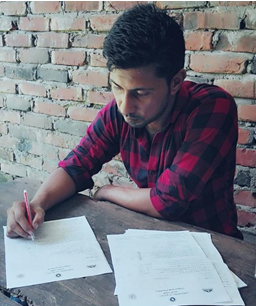One Person Can Make A Difference
For the past 8 years, Mohammad Rubel has worked as a family planning inspector, mentoring family welfare assistants to ensure that the people in his locality receive proper health care services. Now, BCCP under Ujjiban project has equipped him to support his colleagues from neighboring areas to provide better care to the people in their communities. Md. Rubel, 34, has been working as a family planning inspector (FPI) at Upazila Family Planning office in Hathazari upazila of Chattogram district.
Md. Rubel, 34, has been working as a family planning inspector (FPI) at Upazila Family Planning office in Hathazari upazila of Chattogram district.
FPIs are an integral tier of the cadre of frontline family planning workers employed by the Ministry of Health and Family Welfare. They supervise the family welfare assistants (FWAs) who make regular visits to households and link people to institutional care at the hospitals, community clinics or upazila health complexes in their locality. The FWAs are responsible for counselling, increasing awareness and generating demand for health seeking behavior amongst people on family planning, antenatal care, postnatal care, essential newborn care and immunization. They reach out to as many as 25,687 people in their respective communities. It is then up to an FPI to make certain that their clinic runs like a well-oiled machine so that the people in their communities receive proper counselling and health care services.
In September 2019, when the MoHFW and Ujjiban piloted the SBCC Activity Monitoring Checklist for Supervisors (SAMCS), Rubel was among the first to receive the training. He later received the SAMCS refresher training in December 2020, as well as the troubleshooting training on SAMCS. The SAMCS app aims to strengthen monitoring of SBCC activities at the field level. The training provided field supervisors, like Rubel, with the technical knowledge to use the app and ensure that their staff are conducting SBCC activities as planned.
After receiving the training from BCCP staff of Ujjiban project, he became one of the frequent users of the app. Using the app, he regularly monitors and coordinates the activities conducted by the FWAs, and gives feedback to them where necessary to improve client counselling and clients’ accessibility to services. Not only that, but Rubel has gone one step further and employed his knowledge and skills to enhance health services provision in the neighboring communities. He has mobilized and extended support to his colleagues in the family planning department and the health department, i.e. health inspectors (HIs) and assistant health inspectors (AHIs), upazila family planning officers (UFPOs), upazila health, family planning officers (UH&FPO) and other FPIs, to use the SAMCS app the way he does to monitor and coordinate field implementation and activities.
He took the initiative and created a group chat on Facebook Messenger with all FPIs, HIs and AHIs and some UFPOs and UH&FPOs from the Hathazari upazila. Through this group he stays connected with his colleagues, engages in discussions about monitoring and is able to provide needs-based support to his colleagues to effectively use the SAMCS app.
Rubel hopes to extend the SAMCS use and technical support to all the frontline supervisors of the family planning and health departments, encouraging them to use the app as a regular monitoring tool for interventions.
“Remarkable advances in health and family planning can be made when we, supervisors from both health and family planning departments, work together to attain the set targets and results ”.
